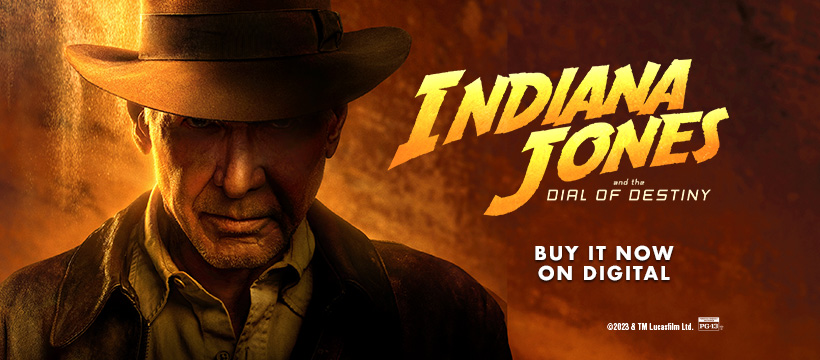
Editor-in-Chief Alex Taylor reviews Indiana Jones and the Dial of Destiny, saluting Harrison Ford in his final outing as Dr Jones.
In a summer filled with fantastic cinema, Indiana Jones and the Dial of Destiny (2023) whipped up little engagement from audiences, especially when pitted against the zeitgeist behemoth of ‘Barbenheimer’. Despite not being a complete return to form, after the universally discredited contribution of Indiana Jones and the Kingdom of the Crystal Skull, the film simply did not get the attention that its prior instalments earned.
The dynamic between Ford and Waller-Bridge’s characters is resonant of the relationship between Indy and his father (Sean Connery) two films prior
This addition to the franchise excavates precious and mismatched fragments of the prior films and attempts to staple them together. Unexpectedly, the film opens in New York in the late 1960s, Indiana Jones (Harrison Ford) drunkenly sits in a cramped apartment, the sum of his adventures, and the recovery of countless, priceless artefacts has landed him an inconsequential existence. The noisy block of mediocre flats is far from the grandeur of his red-brick university job. Marion (Karen Allen) has left him, his newfound son Mutt (Shia LaBeouf) was killed in the Vietnam War (an unsurprising and understandable detail).
Dr Jones no longer teaches to packed lecture halls to engrossed students (fans), he is an older man, who after the fading of his youth, is only left with a deep appreciation for the history he has dedicated his life to preserving. It’s Phoebe Waller-Bridge’s character (Helena Shaw), Indy’s estranged goddaughter and archaeology student, who wakes the character from his depressive slumber, reigniting his passion for a long-lost artefact, a dial supposedly designed by Archimedes that Indy once encountered before. The dynamic between Ford and Waller-Bridge’s characters is resonant of the relationship between Indy and his father (Sean Connery) two films prior, with older Indiana Jones symbolically meeting the younger version of himself in his goddaughter. This, when working at its best, portrays how far the character develops throughout the series, a trait which goes largely unrecognised.

The film features a purely brilliant flashback sequence set amid the Second World War, starring a masterfully de-aged Harrison Ford. The absorbing sequence is strong enough to act as a short film in its own right. The story, the stakes, the dry humour, alongside the perfect use of cinematography, practical effects, and an obvious appreciation for the aesthetic of the original films proves that James Mangold entirely understood the assignment. In this sequence specifically, in Indiana Jones’ search for treasure, James Mangold achieved alchemy. It’s a travesty that Indy’s flashbacks don’t feature more heavily throughout the piece, alongside his underused companion, Basil Shaw (Toby Jones). Basil heroically bumbles behind Dr Jones’ bravado, acting as a quintessential English University Professor. It tantalisingly depicts Indy in his natural habitat, with dependably evil Nazi enemies, led by a dependable actor to portray their leader, Voller (Mads Mikkelsen), who is transporting artefacts for Hitler’s Führermuseum.
The film features a purely brilliant flashback sequence set amid the Second World War, starring a masterfully de-aged Harrison Ford
After their altercation, Voller returns some 25 years later, after erasing his past and aiding America in the space-race, he now races against the protagonists to find the dial, which (when the two halves are brought together), supposedly allows its possessor to leap across time.
After James Mangold’s resounding success from Logan (2017), which bravely rebranded the sprightly superhero Wolverine (Hugh Jackman) into an aged and desperate figure, it is easy to feel that this approach could have been masterfully reworked. Given Harrison Ford’s advanced age, and Dial of Destiny truly being his final performance in the role (unlike Hugh Jackman), the poignancy that could have come from witnessing an action star truly grappling with the limitations of age would have been a powerful and emotionally resonant choice. The film does undeniably touch on this, with the character complaining of shattered vertebrae, and not once swinging from his whip, it however feels as if Disney potentially may not have wanted to tread such a divisive path.
Verdict
Indiana Jones and the Dial of Destiny is an entirely unnecessary film, but it would be underselling it to say that it achieves nothing new. They treat Harrison Ford’s age with the utmost respect, with him rarely being undermined or presented as out of touch because of it, despite these being potentially extremely interesting themes if explored correctly. The ancient Greek setting, and the straying from the focus of Christian artefacts, is refreshing for the series. Alongside this, by utilising real ancient Greek ruins, the film portrays locations which are largely inaccessible for the vast majority of the audience. However, the true treasure in this film, is the performance of Harrison Ford. He portrays the true range of his acting, bringing a vulnerability, sensitivity and depth which demystifies the macho attributes of the character, and cements his own reputation as not only an action hero, but a true cinematic legend.
Rating: 7/10
Indiana Jones and the Dial of Destiny is available on streaming now
Enjoyed this review? Check out these other reviews from Redbrick Film:

Comments